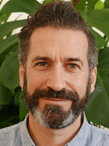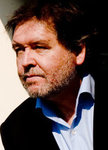Here’s a more detailed biography of each of our speakers for this year’s Green Architecture Day
Oliver Heath
 Oliver is Founder of Oliver Heath Design Ltd, an architectural and interior design practice focussed on delivering health & wellbeing in the built environment through evidenced based human centred design. Oliver’s work stimulates the adoption of happier, healthier places to live and work through his projects as designer, writer, and TV presenter. Oliver is the author of 3 books, the most recent being Urban Eco Chic (Quadrille).
Oliver is Founder of Oliver Heath Design Ltd, an architectural and interior design practice focussed on delivering health & wellbeing in the built environment through evidenced based human centred design. Oliver’s work stimulates the adoption of happier, healthier places to live and work through his projects as designer, writer, and TV presenter. Oliver is the author of 3 books, the most recent being Urban Eco Chic (Quadrille).
Oliver is a qualified Domestic Energy and Green Deal Assessor and is passionate about sustainable design. His human centred Biophilic Design approach seeks to reduce stress by strengthening the human connection with nature to improve health and well-being in the many spaces we live and work in. Oliver is currently a Biophilic Design ambassador for Interface flooring.
Dr Melissa Fernández Arrigoitia
 Dr Melissa Fernández Arrigoitia is a Lecturer in Urban Futures at Lancaster University’s Sociology Department. Her interdisciplinary work focuses primarily on housing and critical geographies of the home. This includes a long-term ethnography into the production of alternative home futures and collaborative, community-led practices, notably senior co-housing, in London. She has pursued a range of questions regarding urban belonging and exclusion in the UK, Europe, Latin America, South Asia and the Caribbean; including the construction and demolition of social housing. She is co-editor of the books (with Brickell, K. and Vasudevan, A.) Geographies of Forced Eviction: Dispossession, Violence, Insecurity (2017, Palgrave) and (with Scanlon, K. and Whitehead C.) Social Housing in Europe (2014, Wiley).
Dr Melissa Fernández Arrigoitia is a Lecturer in Urban Futures at Lancaster University’s Sociology Department. Her interdisciplinary work focuses primarily on housing and critical geographies of the home. This includes a long-term ethnography into the production of alternative home futures and collaborative, community-led practices, notably senior co-housing, in London. She has pursued a range of questions regarding urban belonging and exclusion in the UK, Europe, Latin America, South Asia and the Caribbean; including the construction and demolition of social housing. She is co-editor of the books (with Brickell, K. and Vasudevan, A.) Geographies of Forced Eviction: Dispossession, Violence, Insecurity (2017, Palgrave) and (with Scanlon, K. and Whitehead C.) Social Housing in Europe (2014, Wiley).
Kath Scanlon, Policy Fellow, LSE
 Kath Scanlon is Distinguished Policy Fellow at LSE London. Her work is grounded in economics but also draws on techniques and perspectives from other disciplines including geography and sociology, and aims at improving the evidence base for policy decisions at national or local level. She has conducted evaluations of several residential development projects in London, as well as of state and local housing policies in Europe, the UK and the Caribbean, employing both quantitative and qualitative techniques. She is a longtime collaborator of the Council of Europe Development Bank, and helped develop their framework for evaluating projects to improve housing for migrants and vulnerable groups.
Kath Scanlon is Distinguished Policy Fellow at LSE London. Her work is grounded in economics but also draws on techniques and perspectives from other disciplines including geography and sociology, and aims at improving the evidence base for policy decisions at national or local level. She has conducted evaluations of several residential development projects in London, as well as of state and local housing policies in Europe, the UK and the Caribbean, employing both quantitative and qualitative techniques. She is a longtime collaborator of the Council of Europe Development Bank, and helped develop their framework for evaluating projects to improve housing for migrants and vulnerable groups.
Karen Flatt, RIBA
 Karen Flatt is an architect and Studio Director at IBI Group who specialises in mental health design and has a profound knowledge of both service-users‘ and healthcare professionals’ unique requirements. She has successfully designed and delivered numerous mental health schemes across different age groups and security levels.
Karen Flatt is an architect and Studio Director at IBI Group who specialises in mental health design and has a profound knowledge of both service-users‘ and healthcare professionals’ unique requirements. She has successfully designed and delivered numerous mental health schemes across different age groups and security levels.
Karen believes that building environments play a significant role in the behaviour of their users and good design can deliver real and measurable benefits. Her aim at IBI is to involve users in all aspects of the design process to create uplifting and therapeutic buildings that improve mental and physical wellbeing.
Kelvin Campbell, BArch RIBA MRTPI FRSA
 Kelvin Campbell is a collaborative urbanist and writer. He is the chair of Smart Urbanism and the Massive Small Collective, an international network of collaborators facilitated by his son Andrew Campbell, a sustainability expert.
Kelvin Campbell is a collaborative urbanist and writer. He is the chair of Smart Urbanism and the Massive Small Collective, an international network of collaborators facilitated by his son Andrew Campbell, a sustainability expert.
After founding and leading Urban Initiatives, a successful urban design practice, for over two decades, he decided to step aside and take a different perspective on urbanism—something he is passionate about.
Former visiting professor in urban design at the University of Westminster and chairman of the Urban Design Group, Campbell is now honorary professor at the Centre for Advanced Spatial Analysis at the Bartlett School of Architecture, University College London, and lecturing in the Masters in Sustainable Urban Development program at Oxford University. In 2013, he received the Urban Design Group’s Lifetime Achievement Award and was later awarded the Built Environment Fellowship by the Royal Commission for the Exhibition of 1851.
Recent publications include The Massive Small Compendium: Ideas, Tools and Tactics for Urban Society.
Maria Brenton
 Maria Brenton is the UK Cohousing Network’s Senior Cohousing Ambassador, and a trustee of the UK Cohousing Network Trust. A former academic, she has for many years worked with the OWCH (Older Women’s Cohousing) Group, who at the end of 2016, moved in to ‘New Ground’ Cohousing in North London, the UK’s first and only Senior Cohousing Community so far. Maria is on the steering group of an inter-disciplinary and inter-university research team, ‘Home futures for later life’ at LSE, which has made a start on evaluating the health and wellbeing impact of the senior cohousing model.
Maria Brenton is the UK Cohousing Network’s Senior Cohousing Ambassador, and a trustee of the UK Cohousing Network Trust. A former academic, she has for many years worked with the OWCH (Older Women’s Cohousing) Group, who at the end of 2016, moved in to ‘New Ground’ Cohousing in North London, the UK’s first and only Senior Cohousing Community so far. Maria is on the steering group of an inter-disciplinary and inter-university research team, ‘Home futures for later life’ at LSE, which has made a start on evaluating the health and wellbeing impact of the senior cohousing model.
Maria has researched and written about cohousing in various countries, visiting communities in Holland, Denmark, Sweden, Germany, Italy and the USA. She is an enthusiastic advocate of this way of living both for older people and for societies confronting the challenge of ageing.
Duncan Baker-Brown, RIBA FRSA

Duncan has practised, researched and taught around issues of sustainable development for over 25 years. He has worked on projects as diverse as ‘The Greenwich Millennium Village’ in London with Ralph Erskine, and more recently the multi-award-winning New Country House and Estate Master Plan in Sussex UK. Author of ‘The Re-Use Atlas: a designer’s guide towards a circular economy’ published by RIBA, he is perhaps best known for a series of thought-provoking ‘house’ projects testing issues of sustainable design and resource management including ‘The House that Kevin Built’ in 2008 and ‘The Brighton Waste House’ in 2014.
Duncan’s research tests the viability of a number of practices and materials, recognising the potential of discarded “waste” as a valuable resource in the future of construction, as well as live projects as valuable teaching aides. Through his projects he fosters community development and regeneration, working with apprentice builders and students, informing young people of all ages as to their role in sustainable living. Duncan creates examples of community practice that, through the use of innovative techniques such as ‘resource mapping’ can redefine what local materials are and match them with local skills and trades.
Duncan is currently the Principal Investigator for a €3 million Interreg research programme considering the viability of local waste flows to be processed into insulation for the social housing sector. He lectures widely on issues relating to sustainable development in the design and construction industry and has recently curated ‘The WasteZone’, a three-day symposium involving over 25 invited speakers including Prof. Walter Stahel, Prof. Michael Braungart and David Benjamin of New York’s ‘The Living’.
Ian Brown
 Ian Brown has been teaching low impact building and sustainable construction for many years. He is an experienced carpenter and builder, specialising in straw bale building and historic restoration. Ian currently heads up sustainable building projects for Hartley Quinn Wilson.
Ian Brown has been teaching low impact building and sustainable construction for many years. He is an experienced carpenter and builder, specialising in straw bale building and historic restoration. Ian currently heads up sustainable building projects for Hartley Quinn Wilson.